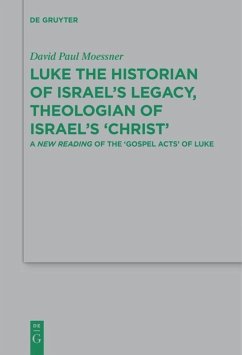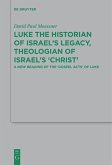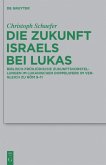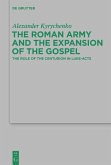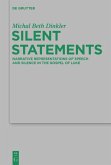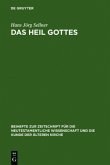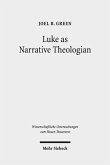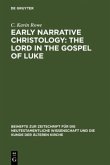Luke is the first New Testament author to reflect on the Jewish scriptures as written rolls bunched together along a twofold (â??Moses and all the prophetsâ?), or threefold collection (â??the law of Moses and the prophets and the psalmsâ?) that point together severally, and as a whole to the â??Messiah Jesus who must suffer.â? Thus Luke is already conceiving a proto-Bible that anticipates the â??bookâ? of the third/fourth century CE when the first Christian Bibles or codices of Vaticanus and Sinaiticus will have emerged. As the first ?biblicalâ?? theologian Luke construes scriptural texts as encompassed by an overarching principle of divine â??plan.â? As a Hellenistic historian, Lukeâ??s â??plan of Godâ? epitomizes the divine activity and ?controlâ?? of ?historicalâ?? development. As biblical theologian and Hellenistic historian, Luke perceives in both the whole and the parts of â??the scripturesâ? a coherent rationale of divine intent and action for Israel that comprehends all of Israelâ??s history. Lukeâ??s divine ?planâ?? is thus ?arrangedâ?? into a narrative plan that re-presents the divine fulfillment as a scriptural necessity in the life, death, and exaltation of Israelâ??s Christ (Luke) and witness of Messiah through his followers ?to the end of the earthâ?? (Acts).
David Moessner proposes a new understanding of the relation of Luke's second volume to his Gospel to open up a whole new reading of Luke's foundational contribution to the New Testament. For postmodern readers who find Acts a 'generic outlier,' dangling tenuously somewhere between the 'mainland' of the evangelists and the 'Peloponnese' of Paul-diffused and confused and shunted to the backwaters of the New Testament by these signature corpora-Moessner plunges his readers into the hermeneutical atmosphere of Greek narrative poetics and elaboration of multi-volume works to inhale the rhetorical swells that animate Luke's first readers in their engagement of his narrative. In this collection of twelve of his essays, re-contextualized and re-organized into five major topical movements, Moessner showcases multiple Hellenistic texts and rhetorical tropes to spotlight the various signals Luke provides his readers of the multiple ways his Acts will follow "all that Jesus began to do and to teach" (Acts 1:1) and, consequently, bring coherence to this dominant block of the New Testament that has long been split apart. By collapsing the world of Jesus into the words and deeds of his followers, Luke re-configures the significance of Israel's "Christ" and the "Reign" of Israel's God for all peoples and places to create a new account of 'Gospel Acts,' discrete and distinctively different than the "narrative" of the "many" (Luke 1:1). Luke the Historian of Israel's Legacy combines what no analysis of the Lukan writings has previously accomplished, integrating seamlessly two 'generically-estranged' volumes into one new whole from the intent of the one composer. For Luke is the Hellenistic historian and simultaneously 'biblical' theologian who arranges the one "plan of God" read from the script of the Jewish scriptures-parts and whole, severally and together-as the saving 'script' for the whole world through Israel's suffering and raised up "Christ," Jesus of Nazareth.In the introductions to each major theme of the essays, this noted scholar of the Lukan writings offers an epitome of the main features of Luke's theological 'thought,' and, in a final Conclusions chapter, weaves together a comprehensive synthesis of this new reading of the whole.
David Moessner proposes a new understanding of the relation of Luke's second volume to his Gospel to open up a whole new reading of Luke's foundational contribution to the New Testament. For postmodern readers who find Acts a 'generic outlier,' dangling tenuously somewhere between the 'mainland' of the evangelists and the 'Peloponnese' of Paul-diffused and confused and shunted to the backwaters of the New Testament by these signature corpora-Moessner plunges his readers into the hermeneutical atmosphere of Greek narrative poetics and elaboration of multi-volume works to inhale the rhetorical swells that animate Luke's first readers in their engagement of his narrative. In this collection of twelve of his essays, re-contextualized and re-organized into five major topical movements, Moessner showcases multiple Hellenistic texts and rhetorical tropes to spotlight the various signals Luke provides his readers of the multiple ways his Acts will follow "all that Jesus began to do and to teach" (Acts 1:1) and, consequently, bring coherence to this dominant block of the New Testament that has long been split apart. By collapsing the world of Jesus into the words and deeds of his followers, Luke re-configures the significance of Israel's "Christ" and the "Reign" of Israel's God for all peoples and places to create a new account of 'Gospel Acts,' discrete and distinctively different than the "narrative" of the "many" (Luke 1:1). Luke the Historian of Israel's Legacy combines what no analysis of the Lukan writings has previously accomplished, integrating seamlessly two 'generically-estranged' volumes into one new whole from the intent of the one composer. For Luke is the Hellenistic historian and simultaneously 'biblical' theologian who arranges the one "plan of God" read from the script of the Jewish scriptures-parts and whole, severally and together-as the saving 'script' for the whole world through Israel's suffering and raised up "Christ," Jesus of Nazareth.In the introductions to each major theme of the essays, this noted scholar of the Lukan writings offers an epitome of the main features of Luke's theological 'thought,' and, in a final Conclusions chapter, weaves together a comprehensive synthesis of this new reading of the whole.
"The book is certainly worth recommending to every theological library."
Zdzislaw J. Kapera in: The Polish Journal of Biblical Research 16, 2017, pp. 102-103
"[...] I came away with a deeper understanding of Moessner's significant contribution [...]"
Joshua W. Jipp in: Journal of Evangelical Theological Society (2018), 647-649
"We have here, in this important collection, the fruits of a life-time of informed reflection on Luke and Acts in their original literary setting. The exegetical proposals are argued with exceptional care, the comparisons with Hellenistic literature are uniformly insightful, and the attempt to read Luke-Acts through Greco-Roman historiography is convincing."
Dale C. Allison, Jr., Princeton Theological Seminary
"David Moessner's collection of learned essays impressively synthesizes his sustained scholarly exploration of Luke-Acts as a coherent narrative. Moessner portrays Luke as simultaneously a Hellenistic historian embodying Greco-Roman literary theory and practice and a biblical theologian deeply engaged with interpretation of Israel's Scripture. No other scholar has so carefully delineated the implications of reading Luke's work as a fusion of these streams of tradition. This book is essential reading for interpreters of Luke's Gospel and the Acts of the Apostles."
Richard B. Hays, George Washington Ivey Professor of New Testament, The Divinity School, Duke University
"Professor Moessner has for many years made significant contributions to our understanding of Luke-Acts, contributions based in part on his deep learning in ancient literary theory, in part on his close exegesis of Luke's language, and in part on his firm grasp of the theological framework within which Luke works. The present volume of studies enables scholars - who may have been aware only of scattered essays - to appreciate the full range and depth of his scholarship."
Luke Timothy Johnson, Robert W. Woodruff Professor of New Testament and Christian Origins, Emory University
"David Moessner has devoted decades to puzzling out the narrative poetics and biblical theology of the double-work, Luke-Acts. These rich and insightful essays are filled with the important results of his research, both in Hellenistic historiography and in patient reading of the Lukan work itself, in conversation with scholarship on ancient historiography, rhetoric, and narrative poetics, contemporary narrative theory, and biblical theology. The present volume offers a fresh and comprehensive picture of the compositional praxis and results of the work of "the first biblical theologian" with which all New Testament scholars will want to contend."
Margaret M. Mitchell, Shailer Mathews Professor of New Testament and Early Christian Literature, The University of Chicago
"David Moessner setzt bei den Aporien des Zueinanders von Lukasevangelium und Apostelgeschichte an. Da er die Einheit der beiden als antiken Vorgaben folgende Erzählung ernst nimmt, gelingt es ihm, viele Aporien bisheriger Forschung einer Lösung zuzuführen. Moessner beschreibt Lukas konsequent als rhetorisch begabten Theologen, dessen Werk nicht als antike Biographie, sondern als historia zu deuten ist: Das lukanische Doppelwerk versteht Moessner als Erzählung über das Ziel der Schriften Israels, welches durch den Gesalbten Israels, Jesus von Nazaret, in Szene gesetzt wird. Der Text ist Schrift über den "Plan Gottes" mit Israel und der Welt. Moessner hat hier weit mehr als eine Sammlung von Aufsätzen vorgelegt, nämlich das gewichtige, hoch spannend zu lesende Resultat der Forschung vieler Jahre. Wer sich mit dem lukanischen Doppelwerk beschäftigt, sollte an diesem Buch nicht vorüber gehen."
Tobias Nicklas, Universität Regensburg
"This volume brings together previously published essays by David Moessner, a leading and distinctive voice in Lukan studies for over three decades. But this is more than a collection of disparate and occasional essays; by providing contextualizing introductions to each of the five parts and re-configuring each of the essays, Moessner offers an internally coherent and brilliantly compelling thesis: Luke the Hellenistic historian and biblical theologian has deployed various rhetorical conventions and a configuring and re-configuring of Israel's scriptures and "things that have come to full flowering among us" to present the "plan of God" who intends to act salvifically through Israel's suffering Christ for Israel and the world. This volume demands and deserves a hearing with every serious student of Luke and Acts."
Mikeal C. Parsons, Professor and Macon Chair in Religion, Baylor University
"Moessner's essays, spanning over 30 years of study of the Lukan writings, profoundly affect our understanding of Luke's literary and theological achievements. The insistence on seeing Luke and Acts as a single whole ('Gospel Acts'), the comparisons drawn between Luke and other historians of the time, especially those writing large-scale histories, and the analysis of the fundamental importance of Jewish scripture for Luke, are timely and compelling. The resulting picture of Luke as a 'biblical theologian', precisely as a 'historian', is hugely impressive in its scope and detail. Moessner's work will be essential reading for all engaged in Lukan studies for many years to come."
Christopher Tuckett, Emeritus Professor of New Testament Studies, University of Oxford
"Die Arbeiten von David Moessner zum Lukasevangelium und zur Apostelgeschichte gehören seit vielen Jahren zu den wichtigsten Beiträgen, die zum Verständnis dieser beiden Bücher des Neuen Testaments geschrieben worden sind. Sie zeichnen sich samt und sonders durch exegetische Genauigkeit und theologisches Reflexionsvermögen aus, und darum haben sie unser exegetisches, literarisches und theologisches Verständnis des lukanischen Doppelwerks in herausragender Weise bereichert. In den vorliegenden Band haben die wichtigsten Arbeiten Moessners Eingang gefunden. Sie wurden für die neuerliche Publikation überarbeitet sowie durch neue Einleitungen und Zusammenfassungen aufeinander abgestimmt. Auf diese Weise ist ein Band entstanden, der sich durch außerordentliche Kohärenz auszeichnet und ein eindrucksvolles Gesamtbild der Theologie des auctors ad Theophilum entstehen lässt. Dafür schuldet die Lukasforschung David Moessner großen Dank. Man braucht nicht viel Phantasie, um voraussagen zu können, dass dieses Buch auf Grund der Einsichten, die es vermittelt, zu einem für die Lukasforschung unverzichtbaren Standardwerk wird."
Michael Wolter, Rheinische Friedrich-Wilhelms-Universität Bonn
Zdzislaw J. Kapera in: The Polish Journal of Biblical Research 16, 2017, pp. 102-103
"[...] I came away with a deeper understanding of Moessner's significant contribution [...]"
Joshua W. Jipp in: Journal of Evangelical Theological Society (2018), 647-649
"We have here, in this important collection, the fruits of a life-time of informed reflection on Luke and Acts in their original literary setting. The exegetical proposals are argued with exceptional care, the comparisons with Hellenistic literature are uniformly insightful, and the attempt to read Luke-Acts through Greco-Roman historiography is convincing."
Dale C. Allison, Jr., Princeton Theological Seminary
"David Moessner's collection of learned essays impressively synthesizes his sustained scholarly exploration of Luke-Acts as a coherent narrative. Moessner portrays Luke as simultaneously a Hellenistic historian embodying Greco-Roman literary theory and practice and a biblical theologian deeply engaged with interpretation of Israel's Scripture. No other scholar has so carefully delineated the implications of reading Luke's work as a fusion of these streams of tradition. This book is essential reading for interpreters of Luke's Gospel and the Acts of the Apostles."
Richard B. Hays, George Washington Ivey Professor of New Testament, The Divinity School, Duke University
"Professor Moessner has for many years made significant contributions to our understanding of Luke-Acts, contributions based in part on his deep learning in ancient literary theory, in part on his close exegesis of Luke's language, and in part on his firm grasp of the theological framework within which Luke works. The present volume of studies enables scholars - who may have been aware only of scattered essays - to appreciate the full range and depth of his scholarship."
Luke Timothy Johnson, Robert W. Woodruff Professor of New Testament and Christian Origins, Emory University
"David Moessner has devoted decades to puzzling out the narrative poetics and biblical theology of the double-work, Luke-Acts. These rich and insightful essays are filled with the important results of his research, both in Hellenistic historiography and in patient reading of the Lukan work itself, in conversation with scholarship on ancient historiography, rhetoric, and narrative poetics, contemporary narrative theory, and biblical theology. The present volume offers a fresh and comprehensive picture of the compositional praxis and results of the work of "the first biblical theologian" with which all New Testament scholars will want to contend."
Margaret M. Mitchell, Shailer Mathews Professor of New Testament and Early Christian Literature, The University of Chicago
"David Moessner setzt bei den Aporien des Zueinanders von Lukasevangelium und Apostelgeschichte an. Da er die Einheit der beiden als antiken Vorgaben folgende Erzählung ernst nimmt, gelingt es ihm, viele Aporien bisheriger Forschung einer Lösung zuzuführen. Moessner beschreibt Lukas konsequent als rhetorisch begabten Theologen, dessen Werk nicht als antike Biographie, sondern als historia zu deuten ist: Das lukanische Doppelwerk versteht Moessner als Erzählung über das Ziel der Schriften Israels, welches durch den Gesalbten Israels, Jesus von Nazaret, in Szene gesetzt wird. Der Text ist Schrift über den "Plan Gottes" mit Israel und der Welt. Moessner hat hier weit mehr als eine Sammlung von Aufsätzen vorgelegt, nämlich das gewichtige, hoch spannend zu lesende Resultat der Forschung vieler Jahre. Wer sich mit dem lukanischen Doppelwerk beschäftigt, sollte an diesem Buch nicht vorüber gehen."
Tobias Nicklas, Universität Regensburg
"This volume brings together previously published essays by David Moessner, a leading and distinctive voice in Lukan studies for over three decades. But this is more than a collection of disparate and occasional essays; by providing contextualizing introductions to each of the five parts and re-configuring each of the essays, Moessner offers an internally coherent and brilliantly compelling thesis: Luke the Hellenistic historian and biblical theologian has deployed various rhetorical conventions and a configuring and re-configuring of Israel's scriptures and "things that have come to full flowering among us" to present the "plan of God" who intends to act salvifically through Israel's suffering Christ for Israel and the world. This volume demands and deserves a hearing with every serious student of Luke and Acts."
Mikeal C. Parsons, Professor and Macon Chair in Religion, Baylor University
"Moessner's essays, spanning over 30 years of study of the Lukan writings, profoundly affect our understanding of Luke's literary and theological achievements. The insistence on seeing Luke and Acts as a single whole ('Gospel Acts'), the comparisons drawn between Luke and other historians of the time, especially those writing large-scale histories, and the analysis of the fundamental importance of Jewish scripture for Luke, are timely and compelling. The resulting picture of Luke as a 'biblical theologian', precisely as a 'historian', is hugely impressive in its scope and detail. Moessner's work will be essential reading for all engaged in Lukan studies for many years to come."
Christopher Tuckett, Emeritus Professor of New Testament Studies, University of Oxford
"Die Arbeiten von David Moessner zum Lukasevangelium und zur Apostelgeschichte gehören seit vielen Jahren zu den wichtigsten Beiträgen, die zum Verständnis dieser beiden Bücher des Neuen Testaments geschrieben worden sind. Sie zeichnen sich samt und sonders durch exegetische Genauigkeit und theologisches Reflexionsvermögen aus, und darum haben sie unser exegetisches, literarisches und theologisches Verständnis des lukanischen Doppelwerks in herausragender Weise bereichert. In den vorliegenden Band haben die wichtigsten Arbeiten Moessners Eingang gefunden. Sie wurden für die neuerliche Publikation überarbeitet sowie durch neue Einleitungen und Zusammenfassungen aufeinander abgestimmt. Auf diese Weise ist ein Band entstanden, der sich durch außerordentliche Kohärenz auszeichnet und ein eindrucksvolles Gesamtbild der Theologie des auctors ad Theophilum entstehen lässt. Dafür schuldet die Lukasforschung David Moessner großen Dank. Man braucht nicht viel Phantasie, um voraussagen zu können, dass dieses Buch auf Grund der Einsichten, die es vermittelt, zu einem für die Lukasforschung unverzichtbaren Standardwerk wird."
Michael Wolter, Rheinische Friedrich-Wilhelms-Universität Bonn

